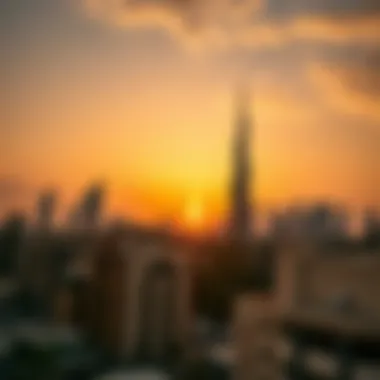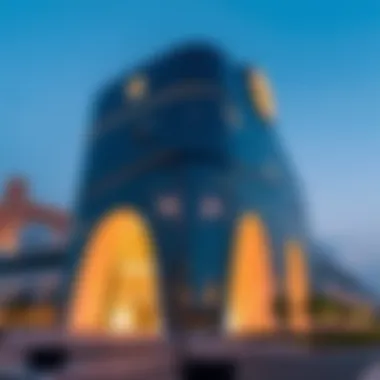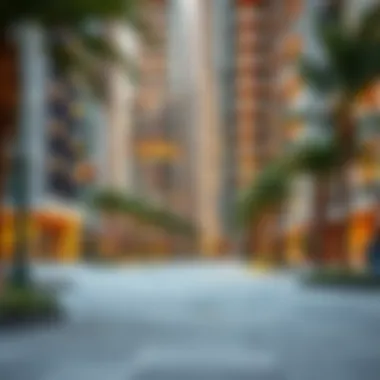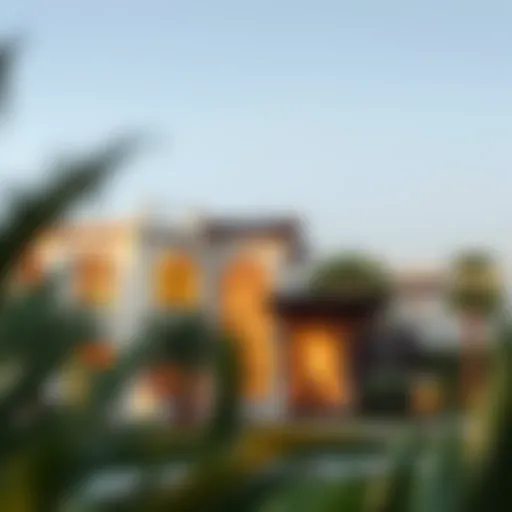The Sun of Abu Dhabi: Exploring Real Estate and Culture


Intro
Abu Dhabi stands as a testament to innovation and resilience in the heart of the UAE. As the capital city, it blends tradition and ultramodern aspirations seamlessly. As visitors stroll along the Corniche or the vibrant streets of Yas Island, they feel the pulse of a city eager to showcase its achievements while maintaining deep-rooted cultural values. The real estate market here reflects this dichotomy, illustrating both the rapid growth and the cultural heritage unique to the region.
Market dynamics shift, influenced by global trends and local initiatives. Investors and homebuyers alike are drawn to the opportunities presented by this burgeoning landscape. Whether considering an investment in luxurious waterfront properties or smaller, more modest apartments, the choices available are as vast as the desert that surrounds the city.
With the upcoming discussions, we aim to spotlight significant market trends, offering insights that can navigate the complexities of investing in Abu Dhabi.
Market Trends and Analysis
Current Market Overview
Abu Dhabi's real estate market has seen a noteworthy rebirth in recent years, driven mainly by governmental efforts to diversify the economy beyond oil dependence. This has paved the way for a myriad of investment possibilities, both residential and commercial.
From an analytical standpoint, the current state of the market is witnessing a gradual yet substantial recovery after past fluctuations. The demand for properties continues to thrive, propelled mainly by foreign investments which have been encouraged through various legislative measures. Buyers are finding a favorable environment where regulations support long-term investments.
Market statistics indicate that property prices in key areas have stabilized, with some regions even witnessing an uptick. According to recent data, locations like Al Reem Island and Saadiyat Island have experienced heightened interest due to their strategic positions and amenities.
"Investing in Abu Dhabi's real estate isn't just about buying a property; it's about securing a lifestyle amid cultural richness and modern infrastructure."
Future Projections
Looking ahead, analysts predict a dynamic market trajectory. With a significant focus on sustainability and green building initiatives, Abu Dhabi aims to continue attracting both local and international investors.
Factors such as the World Expo 2023 and the ongoing development of projects such as the Ghadan 21 initiative provide a substantial backdrop for potential growth. The economic indicators, highlighting a shift towards diversified sectors, present opportunities that could reshape the investment landscape significantly in the next few years. There is an expectation that by 2025, property values may see an increase by upwards of 15%, especially in areas poised for development.
Investors considering Abu Dhabi often find themselves at the crossroads of tradition and modernity. As developments in infrastructure and lifestyle projects unfold, the market will continue to evolve, encouraging those who wish to make informed decisions now.
Investment Opportunities
High-Growth Areas
When seeking profitable investments, certain regions in Abu Dhabi consistently rise to the forefront. Al Reem Island, with its mixed-use developments, presents a solid choice for both residential and commercial properties.
Here are some standout locations:
- Yas Island: Known for entertainment and leisure, it continues to grow as a residential option.
- Corniche Area: Offers picturesque waterfront properties and is highly sought after for its lifestyle.
- Saadiyat Island: Hosts art and culture alongside luxury living, perfect for the upmarket investor.
Rental Yield Insights
Understanding rental yields is essential for discerning investors. Currently, neighborhoods like Al Raha Beach reveal strong yields, often nearing 7-8%. This is particularly attractive for those considering buy-to-let options in a city where tourism steadily boosts demand for rental properties. Properties along the Corniche and Yas Island are also experiencing competitive rental markets, serving both expats and long-term residents seeking comfortable accommodations.
Abu Dhabi boasts a conducive environment for both living and investment, attracting individuals keen on a combination of cultural heritage and modernity. As the city evolves, so will the opportunities it presents, drawing together a diverse range of investors with a shared vision for prosperity and growth.
In summary, the dynamics at play in Abu Dhabi’s real estate market offer exciting prospects for those looking to make a mark in the property landscape, making it imperative for potential investors to stay informed about ongoing trends and developments.
For deeper insights and ongoing updates on Abu Dhabi’s real estate sector, explore resources such as Wikipedia, Britannica, and forums on Reddit.
Prolusion to Abu Dhabi
Abu Dhabi is not just the capital of the United Arab Emirates; it's a tapestry woven with threads of history, culture, and modernity that's ripe for exploration. In the context of this article, understanding Abu Dhabi is crucial as it lays the groundwork for comprehending the real estate opportunities and urban planning that make this city a precious gem in the Middle East. The importance of this section extends beyond mere geography; it encompasses the intrinsic values, traditions, and the unique characteristics that drive real estate dynamics here.
When one considers investing in property or buying a home, recognizing the heart and soul of the city often plays a pivotal role in those decisions. The history informs the present, while the geographical layout offers avenues for future developments.
Historical Overview
The history of Abu Dhabi is rich and multifaceted. Before the discovery of oil, this area was primarily inhabited by fishing communities and bedouins living in modest shelters. The Al Nahyan family, who has ruled since the late 18th century, has been pivotal in shaping Abu Dhabi’s trajectory. In the 1950s, the discovery of oil transformed Abu Dhabi from a small coastal settlement into a thriving capital. Today, it stands as a powerhouse of commerce and culture, celebrating a unique blend of tradition and modernity. This historical backdrop not only influences the lifestyle of residents but also impacts real estate prices and the types of properties that appeal to homebuyers.
Geographical Significance
Positioned on the Arabian Gulf, Abu Dhabi's geographical attributes contribute significantly to its allure. The city covers about 67,340 square kilometers, making it the largest of the UAE's seven emirates. It boasts a coast that extends over 400 kilometers, featuring stunning beaches and islands. Geographic factors also play a role in its economic landscape.
- The proximity to key global trade routes.
- The balance between urban development and ecological zones.
- Expansive parks and natural reserves that present leisurely escapades.
Additionally, the strategic location serves as a prime hub for international business, attracting investors seeking opportunities in a tax-friendly environment. The urban layout is well-planned, allowing for orderly housing development while incorporating green spaces, ensuring that even in a bustling metropolis, there remains room for nature to flourish.
"Understanding the blend of history and geography of Abu Dhabi is invaluable for investors looking to navigate through its real estate market."
As a potential investor or homeowner, being aware of these crucial elements can guide your decision-making process, influencing where and what type of properties one should consider. By understanding the historical and geographical nuances of Abu Dhabi, you place yourself in a stronger position to tap into what this vibrant city has to offer.
Cultural Heritage of Abu Dhabi
Cultural heritage serves as a robust canvas on which the rich narrative of Abu Dhabi is painted. It provides an understanding of the values, beliefs, and practices that have shaped the community over countless years. The blend of tradition and contemporary life is evident, leading to unique experiences that resonate with both residents and visitors.
One cannot overlook how cultural heritage significantly enriches the lifestyle in Abu Dhabi. It fosters pride and ownership among its inhabitants, creating a sense of belonging that is critical in a rapidly industrializing world. Moreover, this heritage becomes a driving force for tourism, drawing in travelers eager to learn about local customs, dances, and poetry. The historical landmarks, such as the Sheikh Zayed Grand Mosque and the Heritage Village, showcase a deep-rooted connection with the UAE's past. They tell tales of the Bedouin lifestyle and the Arabian Gulf's ever-changing dynamics.
Benefits of Preserving Cultural Heritage:
- Emotional Connection: Ties the community to its roots, fostering a deeper understanding between generations.
- Economic Opportunities: Tourism centered around cultural heritage can significantly boost local economies.
- Identity Framework: Offers clarity on the social fabric that helps maintain Abu Dhabi’s unique identity amidst globalization.
In essence, cultural heritage is not merely a backdrop for the daily life in Abu Dhabi; it plays a pivotal role in shaping its trajectory. Bridging the past and the future is essential, as societies develop in the face of modernization. Identity formation, cultural education, and preservation efforts of both tangible and intangible elements become crucial for sustaining Abu Dhabi’s uniqueness.
Traditions and Modernity
Abu Dhabi stands as a testament to how traditions and modernity can coexist in a harmonious yet dynamic landscape. The trick is for the two to intermingle without losing their individual essence. Traditional festivities, like Eid Al Fitr, bring communities together, echoing the importance of family ties and cultural values. These moments remind residents of their legacy and keep the communal spirit alive.


On the flip side, the city embraces modernity with open arms. Skyscrapers like the Etihad Towers symbolize economic growth and innovation. The juxtaposition of glass and stone speaks volumes about how far Abu Dhabi has come, while culturally rooted events, such as the Abu Dhabi International Book Fair, celebrate the blend of old and new narratives.
Bridging traditions with contemporary practices opens avenues for cultural dialogue, where local artisans showcase their crafts in modern galleries, creating a setting where both aspects elevate each other. This fluid mixing allows residents and visitors to experience a dynamic story that keeps evolving.
Influence of Arts and Literature
The arts and literature scene in Abu Dhabi is remarkably vibrant, acting as a catalytic force for cultural evolution. While tracing its roots back to oral poetry and traditional storytelling, the artistic expressions in the city have taken bold strides.
Local artists are increasingly drawing inspiration from their heritage while pushing boundaries. The Manarat Al Saadiyat, for instance, serves as a hub of creativity, offering exhibitions that showcase both local and international talent. Various art installations express not only contemporary sentiments but also reflect the region’s historical narratives, integrating the old with the new seamlessly.
Moreover, literature plays a pivotal role in shaping society's understanding of cultural identity. Authors draw upon their experiences in Abu Dhabi and the greater Gulf region, crafting profound narratives that resonate universally. Publications like the “Abu Dhabi Art Guide” and literary festivals encourage discourse and inspire budding writers.
In summary, arts and literature are powerful mirrors of the societal evolution in Abu Dhabi. They encapsulate the cultural ethos while responding to contemporary challenges and aspirations. This continued exploration is vital not only for cultural preservation but also for promoting an enriching dialogue that defines the Emirati experience.
The Real Estate Landscape
The real estate landscape of Abu Dhabi stands as a crucial focal point not just for potential homebuyers but also for investors and analysts keeping an eye on the regional dynamics. Its significance stems from a confluence of varied factors. The city is undergoing significant transformations, with a blend of cultural heritage and modern initiatives. As circumstances unfold, understanding this landscape becomes essential for making informed decisions.
Current Market Trends
In today’s fast-paced environment, Abu Dhabi's real estate market has witnessed substantial changes. The demand for both residential and commercial properties is reflective of the city’s rising population and economic growth. Recent years have seen a notable shift toward affordable housing without compromising quality. For instance, areas like Al Reem Island are evolving rapidly with new residential projects tailored for young professionals and families alike.
The luxury segment remains robust too, especially near the waterfront areas such as Corniche as they continually attract high-net-worth individuals. The introduction of government policies, aimed at boosting foreign investments, has also shifted market dynamics. Properties in Abu Dhabi are witnessing increased demand from international buyers, fueling a competitive atmosphere.
Key Market Indicators:
- Increased construction activity leading to new housing developments.
- Rise in rental prices in popular districts.
- Expansion of commercial spaces for diverse businesses.
- Development of mixed-use properties catering to lifestyle needs.
Types of Properties Available
Abu Dhabi offers a wide array of properties that cater to different tastes and needs. The diversity ranges from luxurious villas in gated communities to modern high-rise apartments in bustling locations.
Popular types of properties include:
- Residential Villas: These upscale homes often come with private gardens and swimming pools, often located in neighborhoods like Al Ain or Al Saadiyat Island.
- Apartments: Varied styles are available; whether it's a chic studio ideally located in downtown or a spacious three-bedroom apartment with a view of the sea, there's something for every preference.
- Commercial Properties: Retail spaces in vibrant shopping districts are on the rise, providing numerous opportunities for businesses. Office spaces in the Abu Dhabi Global Market also attract various companies.
The sheer variety not only enhances the quality of life for residents but also provides ample opportunities for investors focused on specific niches.
Investment Opportunities
With the real estate market in Abu Dhabi being increasingly open and competitive, the entry of foreign investors has created a vibrant environment ripe for opportunities. Notably, the government's commitment to economic diversification offers several compelling investment avenues.
Potential investment areas include:
- Residential Investments: With an eye on the steady influx of residents, investing in apartments and villas in high-demand areas can yield significant rental returns.
- Commercial Real Estate: The burgeoning sectors such as retail and hospitality present excellent avenues for profit, especially with the upcoming events like World Expo 2020, which are expected to boost tourism and business.
- Off-Plan Properties: Real estate developments that are still in the planning phase can offer lower prices and higher returns once completed due to the increasing demand.
By leveraging the unique characteristics of the Abu Dhabi real estate landscape, investors stand to maximize their returns. With the city’s predefined growth trajectory, there’s no shortage of options available for those willing to navigate the opportunities presented.
Abu Dhabi's real estate sector is evolving rapidly, making it essential to stay informed about trends and opportunities as they arise.
Architecture and Urban Development
Abu Dhabi stands as a testament to visionary planning and architectural prowess. The canvas of this city is painted with innovative structures, blending tradition with modernity. The significance of Architecture and Urban Development within this narrative cannot be overstated; it encapsulates the essence of Abu Dhabi's transformation from a modest fishing village into a flourishing metropolis. Understanding this topic enriches our perception of how urban spaces are shaped, reflecting the aspirations of its people and the ambitions of its leaders.
Modern Architectural Innovations
In the face of rapid modernization, Abu Dhabi has embraced a slew of modern architectural innovations that have redefined its skyline. Take, for instance, the Cleveland Clinic Abu Dhabi, which utilizes cutting-edge technology to provide world-class healthcare services. The architectural design includes sustainability elements that minimizes environmental impact while ensuring comfort and efficiency.
But that's just scratching the surface. Noteworthy is the Louvre Abu Dhabi, a cultural landmark that not only showcases unparalleled art collections but also employs architectural techniques that allow light to filter dramatically through its dome. This structure symbolizes the idea of fusion, drawing connections between different cultures under one remarkable roof.
Another remarkable feature is the Yas Island development, which blends leisure and luxury. With state-of-the-art residential, commercial, and entertainment facilities, its design aims to foster community interaction and create vibrant urban living spaces. All these designs are not merely aesthetic; they are crafted with purpose, aiming for sustainable development and enhancing the quality of life for residents and visitors alike.
Urban Planning Initiatives
The urban planning initiatives in Abu Dhabi are nothing short of transformative. The effectiveness of these plans can be seen in how smoothly the city functions, despite being home to a rapidly growing population. The Estidama program, which stands for sustainability in Arabic, is a notable initiative aimed at promoting sustainable development. This program encourages architects and builders to incorporate green building practices, ensuring that the developments are both innovative and environmentally friendly.
Furthermore, the framework set by the Abu Dhabi Urban Planning Council outlines a long-term vision for the city's growth. This includes meticulous zoning regulations and the creation of integrated transport systems that enhance connectivity from urban centers to suburban areas. These planning measures address not just current needs but anticipate future demands, ensuring a resilient infrastructure that will adapt as the city grows.
Lifestyle and Amenities
The overall quality of life in a city largely hinges on its lifestyle and amenities. In Abu Dhabi, there exists a distinctive blend of tradition and modernity that enhances the living experience for both residents and visitors. This section will delve into the various facets of lifestyle and amenities that make Abu Dhabi a unique place to live, explore, and invest.
Recreational Options
Abu Dhabi is famous for its myriad of recreational options that cater to diverse interests. Whether one is an outdoorsy type or a lover of culture, the city offers something for everyone.
- Parks and Beaches: The city is dotted with lush parks and pristine beaches. Khalifa Park and the Corniche are prime examples where families can enjoy picnics, joggers can stretch their legs, and beach enthusiasts can soak up the sun.
- Cultural Attractions: Places like the Louvre Abu Dhabi and Qasr Al Watan provide splendid opportunities to appreciate art and history. Guided tours through the museums not only entertain but also educate visitors about the rich heritage of the UAE.
- Shopping and Entertainment: Yas Mall and The Galleria are two vibrant hubs that host a variety of shops and dining options. Alongside retail therapy, they also feature entertainment spaces such as cinemas and arcade areas. Additionally, recreational activities such as karting at Yas Marina Circuit make for exciting weekend outings.
Abu Dhabi is perhaps at its best during events like the Abu Dhabi Film Festival or the Formula 1 Grand Prix, where the city truly comes alive, showcasing both its modern flair and cultural richness.
Educational Institutions
For families considering relocation, the quality of educational institutions plays a crucial role. Abu Dhabi does not disappoint in this regard. It boasts a host of international schools and universities that cater to a diverse population.
- International Schools: From the British School Al Khaleej International to the Abu Dhabi International School, parents have myriad choices. Most schools employ a curriculum that meets international standards, preparing students for higher education worldwide.
- Higher Education: The UAE University and the American University of Sharjah are prominent institutions attracting students from various regions. Notably, these universities offer a range of programs in different fields, equipping graduates with skills that align with global job markets.
- Vocational Training: The country is also investing in vocational education to ensure a skilled workforce. Initiatives like Abu Dhabi Centre for Technical and Vocational Education provide hands-on training opportunities.


Parents need to be mindful of the school's accreditation and the success rates of graduates, helping them make informed decisions.
Healthcare Facilities
Access to quality healthcare is another significant consideration for residents in Abu Dhabi. The city is home to state-of-the-art medical facilities equipped to handle everything from routine check-ups to complex surgeries.
- Top-Rated Hospitals: Institutions like Cleveland Clinic Abu Dhabi and Sheikh Khalifa Medical City set high standards in medical care, bolstered by advanced technology and skilled professionals.
- Health and Wellness Centers: Alongside traditional medical facilities, Abu Dhabi also emphasizes wellness. Spas, fitness centers, and holistic health facilities are prevalent, catering to those proactive about their health.
- Emergency Services: The city boasts a well-structured emergency response system, ensuring that residents can receive immediate and effective care during critical situations.
Healthcare accessibility is crucial for maintaining a healthy lifestyle and assures families that quality care is at their fingertips.
The overall amenities in Abu Dhabi create not just a living environment, but a thriving community where life flourishes and opportunities abound.
Economic Factors Affecting Real Estate
In the heart of the United Arab Emirates, the economic factors influencing Abu Dhabi's real estate market warrant a closer examination. These elements play a crucial role in shaping the landscape for homebuyers and investors, both local and international. Understanding how the economic environment affects property values and investor sentiment can help stakeholders make informed decisions.
The real estate sector is a mirror reflecting the overall economic health of Abu Dhabi. When global markets are thriving, demand for properties typically rises, driving up prices. Conversely, economic downturns can lead to price drops and subdued activity in the market. Thus, grasping the nuances of these economic factors is essential for anyone looking to navigate Abu Dhabi's real estate waters effectively.
Impact of Global Markets
The interconnectedness of global economies means that events elsewhere can ripple through Abu Dhabi's real estate market. For instance, fluctuations in oil prices have historically influenced the local economy significantly. As a nation rich in oil reserves, the UAE's financial stability and growth often hinge on these prices. When oil prices are high, the influx of revenue leads to increased spending on infrastructure, housing projects, and other development initiatives.
Moreover, investor confidence generally swells during times of global economic prosperity. This enthusiasm translates to higher demand in Abu Dhabi's real estate, turning the market into a hotbed for property transactions. While global crises, like financial meltdowns or geopolitical tensions, can lead to hesitation from investors, healthy global conditions can bolster both property prices and rental rates.
"A single event in the global arena can affect property values thousands of miles away."
To better understand this relationship, consider the following factors:
- Currency Exchange Rates: A strong dirham may deter foreign buyers, while a weaker currency can make properties more affordable for them.
- Economic Recovery Trends: As key markets rebound, demand for investment properties usually increases, signaling growth.
- Interest Rate Changes: Low-interest rates during periods of global economic growth enable potential buyers to secure favorable loans, enhancing purchase power.
Government Policies and Incentives
Government actions also play a paramount role in determining real estate dynamics in Abu Dhabi. Policies that facilitate economic growth, such as tax incentives and reduced fees for foreign investors, can significantly impact the market. The government has actively pursued strategies to attract international investors, ensuring that the real estate sector thrives.
For instance, initiatives like the introduction of long-term visas for property investors have altered the landscape. Such policies not only encourage investment but also nurture a more vibrant community of expatriates, enhancing the local economy.
Here are some key government initiatives that affect real estate in Abu Dhabi:
- Foreign Ownership Regulations: Allowing foreigners to own freehold properties in designated areas increases attractiveness to overseas investors.
- Funding for Infrastructure: Expansive government investments in infrastructure spur development, making property more desirable.
- Vision 2030 Policies: Aligning with national goals, these policies ensure sustainable practices and innovative projects become standard in real estate development.
Sustainability Practices
In the ever-evolving landscape of real estate, Abu Dhabi is making notable strides in Sustainability Practices, a crucial area that reflects a commitment to both environmental stewardship and resilient urban development. The essence of sustainability here isn't just rooted in preserving the environment; it harmonizes economic growth, a thriving community, and a forward-thinking approach to urban living. With pressing global challenges such as climate change and resource depletion, Abu Dhabi’s investments in this realm offer valuable lessons for homebuyers, investors, and developers alike.
Adopting sustainable practices in real estate is not merely a trend but a necessity. Benefits abound: from reduced operational costs and enhanced property values to improved quality of life for residents. For investors, properties boasting green certifications often attract a more discerning clientele willing to pay a premium for sustainable living. Homebuyers are increasingly favoring homes that promote energy efficiency and contribute positively to the environment.
Moreover, Abu Dhabi serves as a model, demonstrating the long-term advantages of embedding sustainability within urban planning and real estate development. Considerations for sustainable development often include:
- Efficient energy use and energy-efficient technologies
- Use of sustainable materials in construction
- Waste reduction strategies and recycling initiatives
- Integration of green spaces into urban areas, enhancing biodiversity
Leverage these elements, and one can truly appreciate how Abu Dhabi balances development with ecological responsibility.
Green Building Initiatives
The Emirate's Green Building initiatives are a testament to its dedication towards a sustainable future. Prominent developments are utilizing cutting-edge technologies and advanced design principles aimed at minimizing carbon footprints. One notable example is the Estidama (meaning "sustainability" in Arabic) framework, which is a rating system that encourages sustainable building practices throughout the UAE.
The Estidama system awards building projects points on their sustainability efforts ranging from energy use, water conservation to materials sourced responsibly. Projects that have adopted this framework showcase significant reductions in energy consumption—sometimes up to 30%. Through such initiatives, the region aims to ensure that new constructions meet high standards of energy efficiency.
In addition, there are incentives available for project developers who align with these green initiatives, including tax benefits and expedited permitting processes. These initiatives are designed to propel not only private development but also community-wide participation in sustainability efforts.
Community Sustainability Projects
Community sustainability projects further anchor Abu Dhabi’s commitment to environmental responsibility. These grassroots initiatives can significantly change the relationship residents have with their environment. Local programs focusing on waste management and recycling are making waves, creating awareness, and enhancing community engagement.
The Masdar City project, for instance, stands out as an aspirational model integrating residential areas with green technologies and sustainable living standards. Within Masdar City, residents benefit from extensive public transportation, walkable urban designs, and access to renewable energy sources. The project aims to be a zero-carbon city, reducing its reliance on fossil fuels and showcasing what is possible when sustainability is at the core of urban planning.
Additionally, community gardens and local agricultural practices promote not just sustainability but also healthy living among residents. Collaboratively, these projects underscore the spirit of Abu Dhabi—where community, environment, and quality of life converge towards a sustainable future.
"In sustainability, we do not just plan for today— we plan for generations to come, ensuring that the Sun of Abu Dhabi shines brightly for all."
Through these sustainability practices, Abu Dhabi equilibrates progress with preservation, making its real estate a beacon of modernity intertwined with tradition.
For further details on Abu Dhabi’s sustainability initiatives, visit The Abu Dhabi Urban Planning Council and Wikipedia's Sustainability Section.
Safety and Security
Safety and security are fundamental components in the livability and investment potential of any city, and Abu Dhabi is no exception. As the capital of the United Arab Emirates, it is crucial that both residents and investors understand the mechanisms in place for maintaining a secure environment. The significance of safety is woven into the fabric of daily life in Abu Dhabi, enhancing its reputation as a prime destination for homebuyers and investors alike.
Crime Rates and Safety Measures
Abu Dhabi boasts one of the lowest crime rates globally, a statistic that significantly bolsters its appeal. According to reports, serious crimes, such as robbery or violent offenses, are rare. The city maintains a proactive approach toward law enforcement which is ever-vigilant. The police force, known for its professionalism and effectiveness, employs a variety of strategies to deter crime. These include community policing, surveillance, and rapid-response units, all of which contribute to a comfortable living environment.
In addition to these measures, public spaces and neighborhoods are often equipped with CCTV cameras, ensuring that safety is omnipresent. The local government emphasizes the importance of public awareness campaigns, educating the community about safety practices and emergency contacts. Such initiatives foster a culture of responsibility among residents, encouraging individuals to participate in keeping their neighborhoods secure.
To further illustrate the effectiveness of these measures, local forums and community gatherings frequently showcase success stories regarding crime prevention. Residents are invited to share feedback and suggestions—creating a synergistic environment where safety is a communal goal.


Emergency Services Infrastructure
An equally vital element of safety is the emergency services infrastructure within Abu Dhabi. The government has made significant investments in emergency response capabilities to handle various situations, from medical emergencies to fire outbreaks, ensuring that help is always just a call away.
The Abu Dhabi Emergency Services (AD Police) offers a robust framework for responding to incidents. Their response teams are composed of well-trained professionals equipped with state-of-the-art technology. The implementation of smart systems, like automated dispatch for ambulances and fire trucks, reflects the city’s dedication towards innovation in public safety.
Moreover, accessibility to emergency services plays a pivotal role in the overall security landscape. Emergency response units are strategically located to minimize response times across the city. As a result, Abu Dhabi can successfully mitigate potential risks that such urban environments face.
Following an emergency, regular drills and simulations are conducted to ensure that all personnel stay sharp and ready for any real-life scenario. This preparedness not only reinforces community confidence but also establishes a disciplined and coordinated approach to safety.
In summa, the blend of low crime rates and an advanced emergency services infrastructure positions Abu Dhabi as a leading contender in safety rankings, making it an attractive hub for investments and residential living.
Challenges in Real Estate Investment
Real estate investment in Abu Dhabi, while filled with potential, does not come without its hurdles. Understanding these challenges is vital for homebuyers, investors, and industry professionals alike. The real estate landscape in Abu Dhabi can be likened to a double-edged sword; while there are numerous opportunities, significant risks also lurk beneath the surface. This section seeks to dissect key challenges that investors may face, shedding light on the intricacies of the market and providing a knowledgeable framework for navigating these waters.
Market Volatility
The boom and bust cycles of the real estate market in Abu Dhabi underscore the inherent volatility that investors must contend with. Here, price fluctuations can occur due to a multitude of reasons, including economic shifts, changes in demand, and fluctuations in oil prices—a significant contributor to the UAE’s economy.
For instance, global economic downturns may lead to reduced inflow of foreign investments, causing property prices to dip. On the flip side, periods of rapid growth, driven by increased infrastructure development and tourism, can inflate prices exorbitantly. Thus, it is essential for potential investors to track market trends closely.
Key Considerations:
- Timing: Entering or exiting the market at the right moment can mean the difference between profit and loss.
- Research: Regularly following industry reports and market analyses is indispensable for making informed investment decisions.
- Local Insights: Engaging with local real estate agents and analysts can provide up-to-date information on impending shifts in the market, thereby aiding preparedness.
The fluctuating nature of the market requires a delicate balance for investors, as misjudging trends can have severe financial repercussions. Being proactive rather than reactive might just be the key to staying afloat.
Regulatory Challenges
Abu Dhabi's real estate sector is governed by various regulations that are crucial for ensuring fair transactions and protecting investors. However, bureaucratic overhead and frequent changes in policies can present formidable challenges. Navigating through a maze of legal requirements can be daunting for both local and foreign investors.
Understanding the legal framework is vital, as failing to comply can lead to severe penalties, including fines or even imprisonment in extreme cases. The laws governing property ownership, especially for expatriates, are complex and can change unexpectedly. For example, while certain areas in Abu Dhabi may allow foreign ownership, others may impose restrictions.
Important Elements to Keep in Mind:
- Licensing: Ensure all transactions and developments are carried out by licensed professionals to avoid penalties.
- Changing Policies: Stay updated on policy changes that may impact foreign ownership rights and property taxes.
- Legal Guidance: Consulting with legal experts who are well-versed in Abu Dhabi’s real estate laws can aid greatly in mitigating risks and ensuring compliance.
To summarize, while the allure of Abu Dhabi’s real estate market is undeniable, being well-prepared to face these challenges is crucial. Investors should prioritize thorough market research and seek professional assistance as needed to navigate through the complexities of the investment landscape.
"In the realm of real estate, knowledge is not just power; it's what will save you from costly missteps."
Future Outlook of Abu Dhabi's Real Estate
The future of real estate in Abu Dhabi stands as a topic of vital importance for various stakeholders, including homebuyers, investors, real estate agents, analysts, and developers. This segment of the discussion not only highlights potential trends and developments but also delves into the integral role Abu Dhabi plays in the broader economic landscape of the United Arab Emirates. Understanding the future outlook of this market provides key insights into investment strategies and lifestyle decisions, guiding those looking to navigate this dynamic environment.
Abu Dhabi has consistently transformed itself, evolving through multiple phases, and the real estate sector is no exception. Predictions for future trends encompass shifts in housing needs, the integration of technology, and sustainable living practices. These elements are expected to promote growth and enhance the city’s appeal, making it an attractive destination for both investors and expats.
Predicted Trends and Developments
Events on the global stage—like shifts in economic policies and evolving consumer preferences—are shaping the future of real estate in Abu Dhabi. The city’s leadership is keen on diversifying the economy to reduce dependence on oil revenue, which has already led to notable real estate advancements.
- Smart Cities Initiative: Abu Dhabi aims to align itself with modern living standards by investing in smart city technologies. This includes the implementation of Internet of Things (IoT) solutions in residential and commercial properties, making daily life more convenient.
- Sustainable Communities: There is an increasing emphasis on sustainability. Homes and buildings are being developed with eco-friendly materials and technologies, from energy-efficient systems to green spaces that promote a healthier urban environment.
- Affordable Housing Projects: With a growing expatriate community, the demand for affordable housing is on the rise. Developers are responding by constructing budget-friendly units that still maintain quality and aesthetics. This trend helps cater to a broader audience.
Current Opportunities
Project developments such as the New Abu Dhabi Airport and the expansion of the Yas Island entertainment district are just a few examples of future projects anticipated to enhance the city’s attractiveness as a residential and commercial hub. Investors should keep an eye on these initiatives, as they promise a substantial return on investment in the long term.
Role in UAE's Economic Growth
Abu Dhabi's real estate market is much more than mere properties and transactions; it serves as a cornerstone for the United Arab Emirates' overall economic growth. The ongoing initiatives aimed at enhancing infrastructure align with national objectives for economic diversification.
The growth and enhancement of Abu Dhabi's real estate can be looked at through a few key lenses:
- Job Creation: As development projects are rolled out, they create an abundance of job opportunities, not just in construction but also across various sectors, enhancing local and foreign workforce participation.
- Foreign Investment: By creating a stable and attractive environment, the UAE aims to encourage foreign investment. Increased foreign capital influx further boosts the real estate sector and stimulates ancillary markets, such as hospitality and retail.
- Cultural Integration: The expansion of the real estate market facilitates growth in the cultural identity of the city, making Abu Dhabi a melting pot of different lifestyles and communities. This dynamic fosters a unique appeal to residents and visitors alike.
In summary, the future outlook of Abu Dhabi's real estate not only reflects potential growth trends and exciting developments but also significantly impacts the UAE's economic landscape. Understanding this interplay is crucial for anyone looking to capitalize on the opportunities within this evolving market.
“Real estate in Abu Dhabi serves as a mirror to its economic ambitions and aspirations, with each new project telling the story of progress.”
For more detailed insights and statistics, you can refer to UAE government resources, or delve into an in-depth study at britannica.com.
End
In the context of Abu Dhabi's rapidly evolving landscape, the conclusion section serves as a vital anchor, distilling the key elements explored throughout the article. It encapsulates not merely the data but the broader implications of investing in this vibrant city. Multiple factors, from cultural richness to architectural evolution, contribute significantly to why Abu Dhabi is a coveted destination for homebuyers and investors alike.
Recapturing Key Insights
As we traverse the various aspects of Abu Dhabi, several key insights emerge:
- Cultural Significance: The blend of tradition and modernity enriches the real estate landscape, making it appealing for both expatriates and locals. Cultural festivals, museums, and art scenes are more than just recreational; they encapsulate the identity of the city and enhance property value in their proximity.
- Architectural Growth: Innovative architectural designs, from state-of-the-art skyscrapers to sustainable residential communities, redefine city living. Properties like the Etihad Towers and the Guggenheim Abu Dhabi create a unique skyline that attracts international attention and investment.
- Economic Stability: Strengthened by government policies aimed at fostering growth, the economy of Abu Dhabi shows resilience even amidst global market fluctuations. A sound investment climate, bolstered by strategic initiatives, enhances the allure for real estate investment.
- Sustainability: The push towards green building practices and community sustainability projects reflect the city’s commitment to environmental health, undoubtedly increasing the desirability of properties with eco-friendly features.
Each of these factors paints a picture of a city that is not just a place to live, but also a sound investment opportunity.
Final Thoughts on Investment
For potential investors, understanding the dynamics of the Abu Dhabi real estate market is crucial. The prospects are ripe, yet navigating the waters requires astute awareness of various elements:
- Market Volatility: Keeping an eye on changing regulations and global influences is important for making informed decisions. The real estate market can be tricky; understanding the trends can mean the difference between a wise investment and a regrettable one.
- Regulatory Landscape: The UAE government continuously evolves policies to stimulate the economy, which results in various incentives for investors. It is worth staying updated on changes because these can significantly affect investment returns.
- Local Insights: Connecting with local real estate agents or analysts who have their fingers on the pulse of the market can provide insights that are often missed in general research. They understand neighborhood dynamics and can guide buyers towards making choices that resonate with their financial goals.
In summary, while the road to investing in Abu Dhabi may have its bumps, the potential rewards make it worth the journey. Prospective investors should proceed with diligence, leveraging the insights shared to make informed, strategic decisions that align with the city's promising future.











